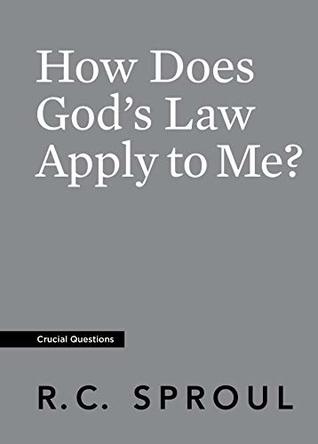More on this book
Community
Kindle Notes & Highlights
by
R.C. Sproul
Read between
August 24 - August 24, 2020
Do we often hear Christians say, “The thing I love the most about my Christian experience is the law of God”? Do we hear people in the church today celebrate the depth of their affection for the law of God? The obvious answer is no.
For a Christian to say, “I once loved the law, but now I love Christ and ignore the law,” is simply not to love Christ, because Christ loved the law.
His motive was not to keep a list of rules but to do the will of the Father. And the Father clearly expresses His will through His law.
that which He wanted His people to do.
Antinomianism is the belief that the law of God—or at least the Old Testament law—is in no way binding or relevant to the Christian life today.
Historically, the church has sought to answer the question of whether Old Testaments laws are still binding today by drawing a distinction between the different types of Old Testament law. According to this view, the law is divided into three categories: the dietary laws, the ceremonial laws, and the moral laws. As helpful as those distinctions may be, we must keep in mind that for the Jew in the Old Testament period, all of the law was moral. It was a moral issue to Daniel, Shadrach, Meshach, and Abednego whether they obeyed the dietary laws of God while they were in exile.
“So the law is holy, and the commandment is holy and righteous and good”
and sin and evil are both defined in light of the law.
Therefore, there is no law outside of God that imposes obligations upon Him.
that God is a law unto Himself. This differs from the idea that God is ex lex in that the behavior of God is never lawless. The actions of God are always in conformity to the law of God’s own nature and character, which is inherently righteous and eternally holy. All of His actions come forth according to who He is.
And good is defined by His nature; He is not bound to a standard of goodness outside Himself. The law we are called to obey is a law that comes from Him. It is His law. It is a law that defines a relationship— the relationship between the Creator and the creature, between the sovereign and the vassal, between the King and His subjects.
Christianity and Judaism assert that there is an absolute standard. What is right and what is wrong is not a matter of relativity. Instead, the ultimate standard is the character of God, and this character is manifested in His law.
With both kinds of sin, we are dealing with a lack of conformity to a standard. We fail to live up to the standard. The New Testament says, “All have sinned and fall short of the glory of God” (Rom. 3:23). We fall short or fail to hit the mark we are required to reach. We miss that requirement when we transgress God’s law or fail to keep it perfectly.
Yes, there was a law in effect. He says, “Death reigned from Adam to Moses” (5:14), and there wouldn’t have been death had there not been sin.
The mirror of the law of God is bad news, but until we look at ourselves in it, we will never understand the goodness of the good news.
Winston Churchill said that with all of its weaknesses, democracy is still the best form of government. He even went so far as to say that tyranny is better than anarchy. The worst form of government is no government at all, where there is no restraint and the common grace of God is obscured.
We are constantly bombarded by Christian subcultural norms and standards that sometimes have little or nothing to do with the will of God.
And as individuals, we all have our pet rules and regulations that define the Christian experience. But the bottom line for the Christian is not, What does my church want me to do? or, What does my fellowship group want me to do? Instead, it is, What does God require of me? What is it that I am called to do to be pleasing to God?
“I don’t care about the Old Testament law,” that is tantamount to saying, “I don’t care about pleasing God.”
We as believers are to imitate Jesus’ zeal for pleasing the Father. And there is no better place to learn what is pleasing to God and what He wants His people to do than by looking in His law.
Apodictic law is the foundational, fundamental law that governs the people.
In addition to being apodictic, the form of the Ten Commandments are also elliptical, meaning that they contain something that is not stated in addition to that which is stated. The unstated content is assumed and can legitimately be inserted. The primary elliptical character of the law of God—which we can see by seeing how Jesus expounds the Ten Commandments in the Sermon on the Mount—is that when the law of God prohibits one thing, it at the same time silently, tacitly enjoins or requires its opposite. And conversely, when it enjoins something, it at the same time prohibits its opposite.
Rather, it means everything from “Do not murder” to “Do promote life.”
It isn’t just a negation of murder; it’s a pro-life statement.
The commandment does not simply prohibit polytheism or idolatry; it prohibits even the acknowledgment of other gods, even if the Lord God is given pride of place. “Before” does not mean “ahead of in rank.” It means that we are not to have any gods before God’s face or in His presence.


